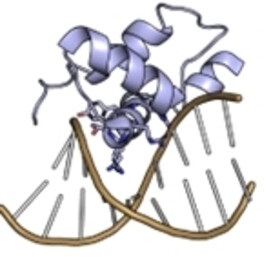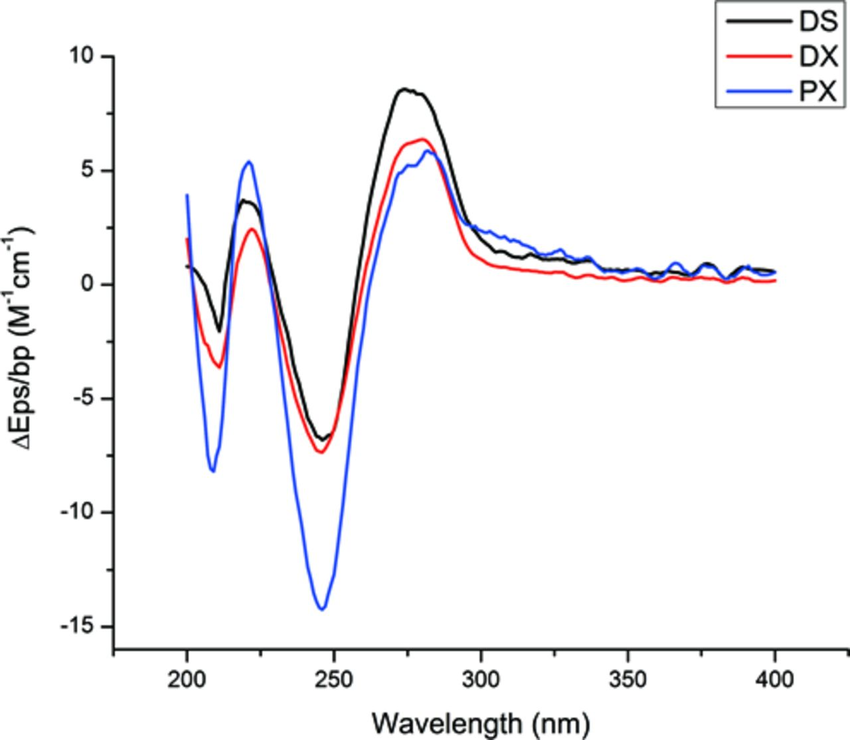Peptide-DNA Interaction Analysis Service
- Screening and Validation of Gene Regulatory Peptides
- Development of DNA-Targeting Peptide Therapeutics
- Aptamer Recognition and Optimization Studies
Peptide-DNA Interaction Analysis Service is designed to comprehensively evaluate the interaction characteristics between peptides and DNA. This service not only determines whether binding occurs but also provides in-depth analysis of affinity constants, binding kinetics, sequence preferences, and conformational changes in DNA upon binding. It supports a wide range of needs in both basic research and applied development.

Paquette AR, Boddy CN. Chembiochem. 2023.
Peptide-DNA interactions are widely involved in key biological processes such as gene regulation, chromatin structure maintenance, DNA repair, and drug delivery. For example, certain short peptide fragments derived from transcription factors can specifically recognize DNA sequences to regulate target gene expression. Additionally, artificially engineered DNA-binding peptides are emerging as important tools in synthetic biology and targeted therapy. Therefore, systematically studying the binding behavior between peptides and DNA-including affinity, specificity, kinetic parameters, and binding sites-is of great significance for elucidating regulatory mechanisms and guiding the design of functional biomolecules.
Services at MtoZ Biolabs
MtoZ Biolabs offers Peptide-DNA Interaction Analysis Service to precisely characterize the binding spectrum, affinity, and kinetics between peptides and specific DNA regions at both in vitro and cellular levels. This service supports interaction studies involving natural or synthetic peptides and various types of DNA (such as dsDNA and ssDNA). Our offerings include, but are not limited to, affinity constant measurement, kinetic parameter analysis, and evaluation of DNA conformational changes upon binding-enabling researchers to comprehensively understand peptide-DNA interaction characteristics.
Peptide-DNA Interaction Analysis Service at MtoZ Biolabs is primarily supported by the following platforms:
Surface Plasmon Resonance (SPR)
By immobilizing DNA sequences on a sensor surface, this method allows real-time monitoring of peptide binding and dissociation, providing key parameters such as affinity (Kd), association rate (kon), and dissociation rate (koff).
Isothermal Titration Calorimetry (ITC)
Measures the heat changes during peptide-DNA binding reactions to calculate thermodynamic parameters and determine the driving forces behind the interaction (e.g., hydrophobic or electrostatic effects).
Fluorescence-Based Methods
Utilizes fluorescence-labeled peptides or DNA to detect signal changes upon binding, offering high sensitivity for affinity measurement and conformational change analysis.
DNA Microarray
Thousands to tens of thousands of DNA probes with different sequences are immobilized on a chip and incubated with peptides to assess sequence preference, binding specificity, and motif recognition capabilities.
DNA Pull-Down Coupled with Mass Spectrometry
Biotin-labeled DNA probes are used to capture binding peptides, followed by enrichment with streptavidin-coated magnetic beads and LC-MS/MS identification to screen DNA-binding peptides from complex samples.
Circular Dichroism (CD) Spectroscopy
Analyzes whether peptide binding alters the secondary structure of DNA, providing supplementary information on structural and functional relationships.

Dong N. et al. Nucleic Acids Research. 2015.
Analysis Workflow
The general workflow of Peptide-DNA Interaction Analysis Service is as follows:
1. Project Evaluation and Experimental Design
2. Sample Preparation and Quality Control
3. Preliminary Binding Screening (optional)
4. Affinity and Kinetics Validation
5. Structural or Binding Site Analysis (optional)
6. Data Integration and Report Delivery
Service Advantages
1. Advanced Analysis Platform: MtoZ Biolabs established an advanced Peptide-DNA Interaction Analysis Service platform, guaranteeing reliable, fast, and highly accurate analysis service.
2. One-Time-Charge: Our pricing is transparent, no hidden fees or additional costs.
3. High-Data-Quality: Deep data coverage with strict data quality control. AI-powered bioinformatics platform integrates all Peptide-DNA Interaction Analysis data, providing clients with a comprehensive data report.
Applications
Application examples of Peptide-DNA Interaction Analysis Service:
Evaluate the binding ability of synthetic or naturally derived regulatory peptides to target DNA sequences, supporting the functional validation and mechanistic study of peptide-based transcriptional regulators.
Assess the recognition capability of candidate peptides toward specific DNA structures (e.g., promoters, cis-regulatory elements) to inform the design of targeted therapies based on nucleic acid interactions.
Investigate whether DNA-binding peptides can function as aptamer modules, expanding their applications in molecular probes, diagnostic reagents, or drug delivery systems.
Related Services
Protein Interaction Analysis Service
How to order?







